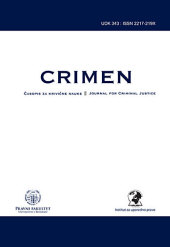GENOCIDNA NAMERA
GENOCIDAL INTENT
Author(s): Jovan ĆirićSubject(s): Criminal Law, Military history, Politics and law, Criminology, Studies in violence and power
Published by: Правни факултет Универзитета у Београду
Keywords: genocide; intent; media; propaganda; politicization; historical continuity;
Summary/Abstract: Due to the tragic events on the territory of the former SFRY, the subject of genocide has become very current topic in wider social and scientific circles. This offense and the Convention on the Prevention and Punishment of the Crime of Genocide (1948), has become rather discussed subject on the territory of former Yugoslavia, but also outside of it. In that sense, the subject of genocidal intent has particularly intrigued Jovan Ćirić, because that element is what substantially defines genocide as such. The common standpoint of classical criminal justice law is that without the intent of destruction of national, ethnical, racial or religious group there is in fact no genocide. However, the problem arises when we try to define the intent itself. In English, for instance, there is no concept, a word that would define the intent. In Serbian literature and language, there is just a slight difference – the intent is mostly defined as special, particularly strong form of intent. Until recently, that was rather common concept in the world literature for the understanding of genocide. However, the trials before the International Criminal Tribunal in Hague concerning former Yugoslavia and Rwanda showed that it is very difficult, almost impossible to prove someone’s guilt, i.e. genocidal intent. Prosecutors Carla Del Ponte and Geoffrey Nice complained during the trial of Slobodan Milošević that they won’t be able to prove genocidal intent. It could be said that is the main reason western European criminal thought developed the theory that the existence of genocide requires no intent, as a special form of ‘strong’ intent, but that the existence of indirect intent is sufficient. The author claims such statements are absurd for they make the intent and genocide into something incidental, much like collateral damage. Related to that is the subject of media prejudice and breach of the presumption of innocence. Namely, media had at one point blown out of proportions the story of guilt and intent of several accused individuals and in such state there was no need to prove the guilt and intent, for the media verdict had already been given.
Journal: CRIMEN - časopis za krivične nauke
- Issue Year: 2015
- Issue No: 1
- Page Range: 27-45
- Page Count: 19
- Language: Serbian

